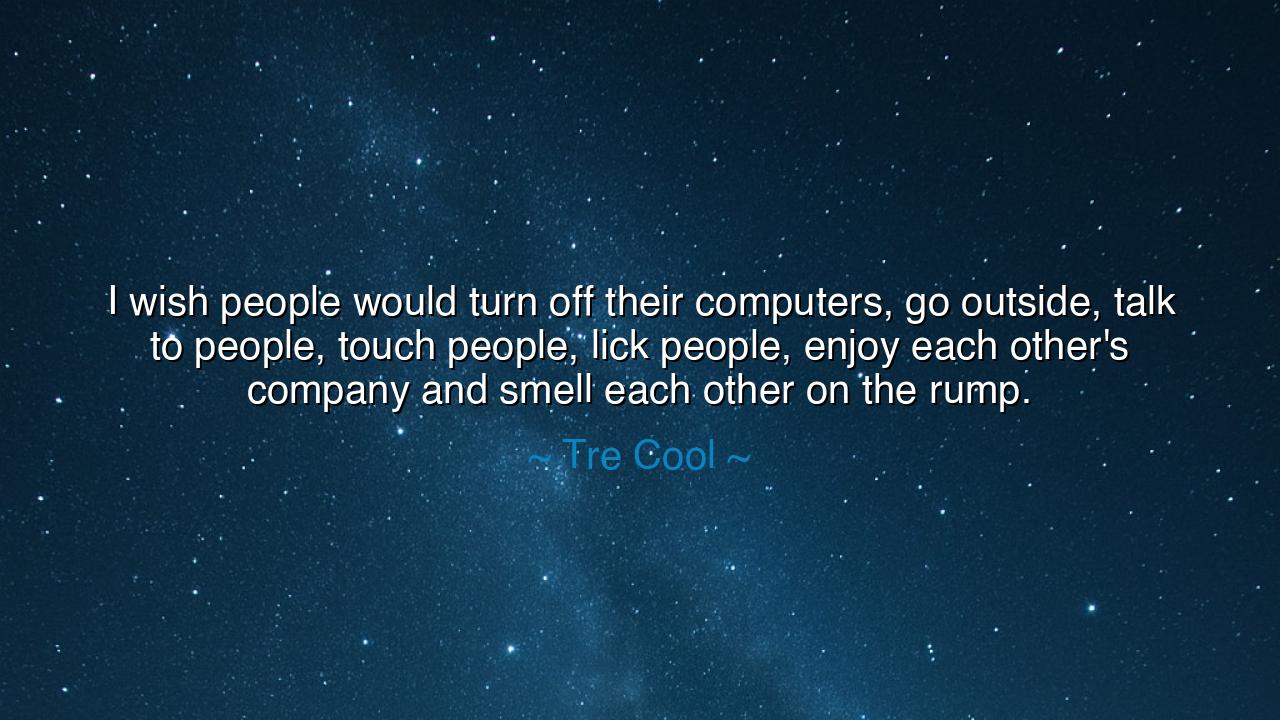
I wish people would turn off their computers, go outside, talk to
I wish people would turn off their computers, go outside, talk to people, touch people, lick people, enjoy each other's company and smell each other on the rump.






"I wish people would turn off their computers, go outside, talk to people, touch people, lick people, enjoy each other's company and smell each other on the rump." These words from Tre Cool may seem playful or even provocative on the surface, but they speak to a profound truth about the human condition. In an era where technology has become all-consuming, where screens dominate our daily lives, Cool's call to return to the physical world, to engage with others directly, and to experience life in its tactile and sensory richness is a reminder that the human spirit thrives in connection, not in isolation behind a screen. His words urge us to reconnect with the physical and emotional aspects of life that technology often distances us from.
In the ancient world, this idea would have been intuitively understood. The Greeks, who founded the philosophy of human flourishing, understood that the mind and body must work in harmony for a person to live a full, virtuous life. Aristotle spoke of the "good life", one that balanced reason and emotion, where the social and physical aspects of life were intertwined. To live well, Aristotle believed, a person needed to participate in the community, engage with others, and cultivate relationships that nourished both the mind and the body. This connection to others, to nature, and to the world around us was seen as an essential part of achieving happiness. In the same vein, Cool’s call is a modern echo of this ancient wisdom—reminding us that human interaction and the physical experience of the world are vital components of our wellbeing.
Imagine the lives of the ancient philosophers in Athens, where great thinkers gathered not just to discuss abstract concepts, but to live and engage with the world around them. The Agora, the heart of Athenian life, was not only a marketplace for ideas but also a space for physical engagement—whether through conversation, the exchange of goods, or simply the shared experience of being among fellow citizens. It was a place where ideas came alive through human contact—through direct engagement rather than digital or distant interactions. This idealized vision of community and connection is what Cool’s words seem to yearn for: a world where the value of human interaction is felt, touched, and experienced in the fullness of its sensory richness.
Consider, too, the life of Socrates, who famously stated that "the unexamined life is not worth living." Socrates didn’t mean that life should be lived in intellectual isolation, detached from the world. Rather, he believed that the true examination of life came through dialogue, through human connection, and through the experience of the world in its vibrancy and reality. To Socrates, thought and reflection were not mere abstract exercises—they were meant to be tested in the real world, in relationships, in the physical spaces where people lived and interacted. Cool’s words seem to invoke a similar call: stop staring at the digital world and engage with the real world that surrounds us, where we can touch, taste, smell, and truly connect.
In modern times, the digital age has revolutionized how we communicate and interact with the world. We live in a world where social media, instant messaging, and virtual communities dominate our social lives. But, as Cool’s words remind us, these virtual connections are no substitute for the physical and emotional bonds that form when people engage in the physical world. There is a depth to human connection that cannot be replicated in the digital space. Whether it’s the comfort of a hug, the laughter shared over a meal, or the moment of understanding that comes from a conversation in person, these are the things that make us truly human. The digital world, while offering convenience and connectivity, can never replace the tactile, sensory experience of being with others.
The lesson from Cool’s words is one of balance and connection. While technology and the digital world offer incredible tools for connection, they can never replace the richness of physical presence and interaction. Humans are social creatures—we thrive on connection, not just communication. The emotional resonance of human interaction cannot be reproduced by computers, no matter how sophisticated they become. By seeking balance and taking time to step away from our screens, to touch and experience life directly, we are nourishing our true nature as social beings. We are embracing the fullness of life that is meant to be felt, tasted, and lived.
In practical terms, this means that we must make a conscious effort to disconnect from our digital devices and engage with the people around us. We must take time to be present, to share physical space, to laugh, touch, and feel the world around us. In doing so, we enrich our emotional lives and strengthen the bonds that are essential to our wellbeing. Just as the ancient Greeks recognized the importance of community, so too must we recognize that true fulfillment comes not from the virtual world, but from the human connections that are experienced in the here and now.
Ultimately, Cool’s words remind us that in this modern age of screens and digital connections, we must remember the ancient truth: humanity thrives on connection, not isolation. Let us step outside, breathe the air, feel the world, and connect with those around us—not just through words, but through the fullness of human presence. By doing so, we ensure that we do not lose sight of what makes us truly human: the ability to experience life together, in all its sensory glory.






AAdministratorAdministrator
Welcome, honored guests. Please leave a comment, we will respond soon